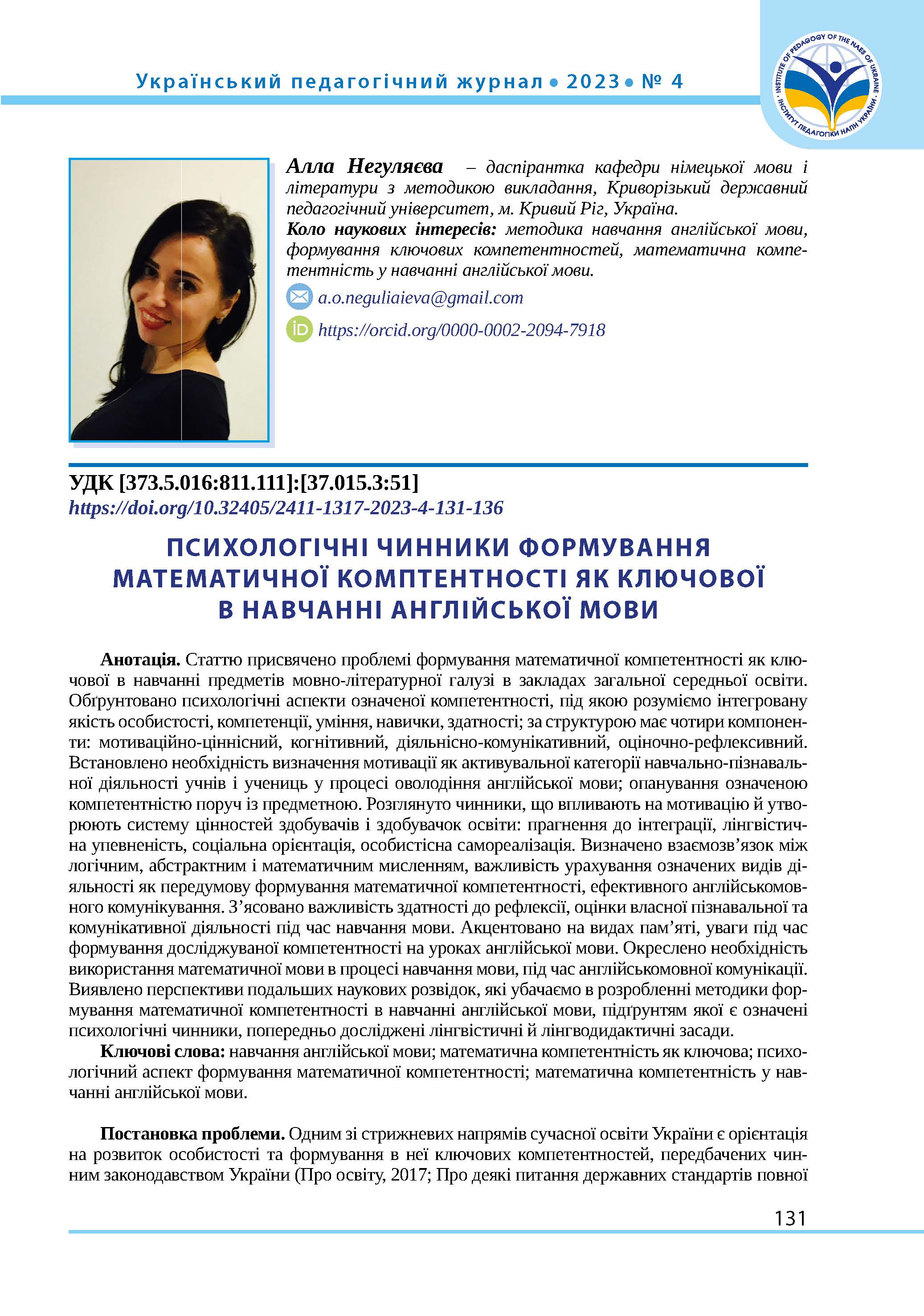Abstract
The paper presents research on the problem of the formation of mathematical competence as a key competence in teaching/learning languages and literature in secondary education institutions. We raised an issue of substantiating the psychological aspect of the defined competence, by which we consider the integrative quality of the individual, which includes specific competencies, skills, and abilities and consists of four components: motivational-valuable, cognitive, activity communicative, and evaluative-reflexive. The need to determine motivation as an activating factor of students’ educational and mental activity in teaching the English language and mastering the specified competence in connection with the subject competence has been established. As factors influencing students’ motivation and forming their value system, we consider the desire for integration, linguistic confidence, social orientation, and personal self-realization. The author defines the importance of considering logical, abstract, and mathematical types of thinking as a condition for the formation of mathematical competence in the process of teaching English and foreign communication. In addition, we revealed the importance of reflecting and evaluating one’s cognitive and communicative activities during language teaching. The author emphasizes the aspects of memory and attention while forming the examined competence in English lessons at secondary education institutions. Furthermore, we outlined the need to use mathematical language in the leading activity of schoolchildren in language learning/teaching – English communication. We proclaim the prospects for further scientific research in developing the methodology for the formation of mathematical competence in teaching the English language, the basis of which are the specified psychological factors, previously investigated linguistic and lingua-didactic aspects.
References
Бакум, З. П., & Негуляєва, А. О. (2023). Математична компетентність та її компоненти в навчанні мови. Перспективи та інновації науки, 11 (29), 36–47. https://doi.org/10.52058/2786-4952-2023-11(29)-36-46
Варій, М. Й. (2009). Загальна психологія. Київ: Центр учбової літератури.
Глобін, О. І., Бурда, М. І., Васильєва, Д. В., Волошена, В. В., Вашуленко, О. П., Мацько, Н. Д., & Хмара, Т. М. (2015). Компетентнісно орієнтована методика навчання математики в основній школі. Методичний посібник.
Костюк, Г. С. (1989). Навчально-виховний процес і психічний розвиток особистості. Київ : Радянська школа.
Максименко, С. Д. (2000). Психологічні чинники розвиваючого навчання в різних освітніх системах: навч. посіб. Київ : НЕВТЕС.
Мойсеєнко, Л. А. (2003). Психологія творчого математичного мислення.
Про деякі питання державних стандартів повної загальної середньої освіти : Постанова Кабінету Міністрів України. (2020). URL : https://zakon.rada.gov.ua/laws/show/898-2020-%D0%BF#n16
Про освіту : Закон України. (2017). https://zakon.rada.gov.ua/laws/show/2145-19#Text
Dörner, D. (1978). Self reflection and problem solving. Human and artificial intelligence, 101–107.
Dornyei, Z. (2005). The psychology of the language learner: Individual differences in second language acquisition. New Jersey: Mahwah.
Rao, R. P. (2003). Attention, models of. Encyclopedia of cognitive science, Vol. 1, 231–237.
Rueda, R., & Chen, C. B. (2005). Assessing motivational factors in foreign language learning: Cultural variation in key constructs. Educational Assessment, 10(3), 209–229.
Tulving, E. (2000). Memory: Overview. In: A. Kazdin (ed.), Encyclopedia of Psychology, 5, 161–162.
Bakum, Z. P., & Neguliaieva, A. O. (2023). Matematychna kompetentnist ta yii komponenty v navchanni movy. Perspektyvy ta innovatsii nauky, 11 (29), 36–47. (In Ukrainian).
Varii, M. Y. (2009). Zahalna psykholohiia. Kyiv: Tsentr uchbovoi literatury. (In Ukrainian).
Hlobin, O. I., Burda, M. I., Vasylieva, D. V., Voloshena, V. V., Vashulenko, O P., Matsko, N D., & Khmara, T. M. (2015). Kompetentnisno oriientovana metodyka navchannia matematyky v osnovnii shkoli. Metodychnyi posibnyk. (In Ukrainian).
Kostiuk H. S. (1989). Navchalno-vykhovnyi protses i psykhichnyi rozvytok osobystosti. Kyiv : Radianska shkola. (In Ukrainian).
Maksymenko S. D. (2000). Psykholohichni chynnyky rozvyvaiuchoho navchannia v riznykh osvitnikh systemakh: navch. posib. Kyiv : NEVTES. (In Ukrainian).
Moiseienko, L. A. (2003). Psykholohiia tvorchoho matematychnoho myslennia. (In Ukrainian).
Pro deiaki pytannia derzhavnykh standartiv povnoi zahalnoi serednoi osvity : Postanova Kabinetu Ministriv Ukrainy. (2020). URL : https://zakon.rada.gov.ua/laws/show/898-2020-%D0%BF#n16 (in Ukrainian).
Pro osvitu: Zakon Ukrayiny`. (2017). https://zakon.rada.gov.ua/laws/show/2145-19#Text (In Ukrainian).
Dörner, D. (1978). Self reflection and problem solving. Human and artificial intelligence, 101–107. (In English).
Dornyei, Z. (2005). The psychology of the language learner: Individual differences in second language acquisition. New Jersey: Mahwah. 283 p. (In English).
Rao, R. P. (2003). Attention, models of. Encyclopedia of cognitive science, Vol. 1, 231–237. (In English).
Rueda, R., & Chen, C. B. (2005). Assessing motivational factors in foreign language learning: Cultural variation in key constructs. Educational Assessment, 10(3), 209–229. (In English).
Tulving, E. (2000). Memory: Overview. In: A. Kazdin (ed.), Encyclopedia of Psychology, 5, 161–162. (In English).

This work is licensed under a Creative Commons Attribution-NonCommercial-ShareAlike 4.0 International License.


